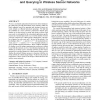Free Online Productivity Tools
i2Speak
i2Symbol
i2OCR
iTex2Img
iWeb2Print
iWeb2Shot
i2Type
iPdf2Split
iPdf2Merge
i2Bopomofo
i2Arabic
i2Style
i2Image
i2PDF
iLatex2Rtf
Sci2ools
121
click to vote
MOBIHOC
2006
ACM
2006
ACM
Fundamental scaling laws for energy-efficient storage and querying in wireless sensor networks
We use a constrained optimization framework to derive fundamental scaling laws for both unstructured sensor networks (which use blind sequential search for querying) and structured sensor networks (which use efficient hash-based querying). We find that the scalability of a sensor network's performance depends upon whether or not the increase in energy and storage resources with more nodes is outweighed by the concomitant application-specific increase in event and query loads. Let m be the number of events sensed by a network over a finite period of deployment, q the number of queries for each event, and N the size of the network. Our key finding is that q1/2 ? m must be O(N1/4 ) for unstructured networks, and q2/3 ? m must be O(N1/2 ) for structured networks, to ensure scalable network performance. These conditions determine (i) whether or not the energy requirement per node grows without bound with the network size for a fixed-duration deployment, (ii) whether or not there exist...
Maximum Network Size | MOBIHOC 2006 | Unstructured Sensor Networks | Wireless Networks | Wireless Sensor Networks |
Related Content
| Added | 24 Dec 2009 |
| Updated | 24 Dec 2009 |
| Type | Conference |
| Year | 2006 |
| Where | MOBIHOC |
| Authors | Joon Ahn, Bhaskar Krishnamachari |
Comments (0)

